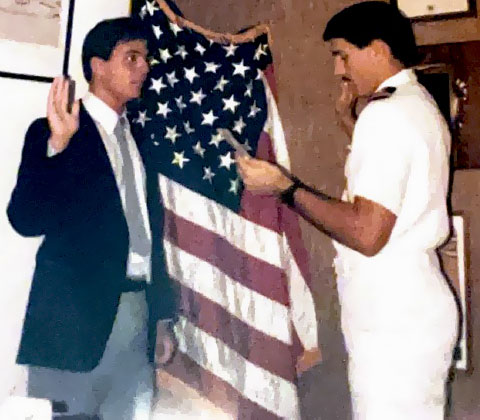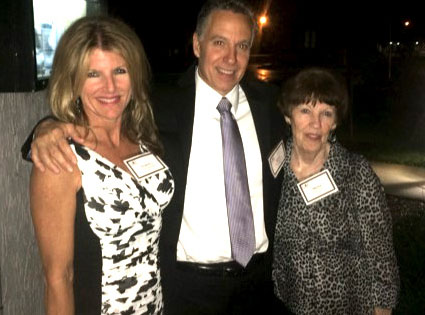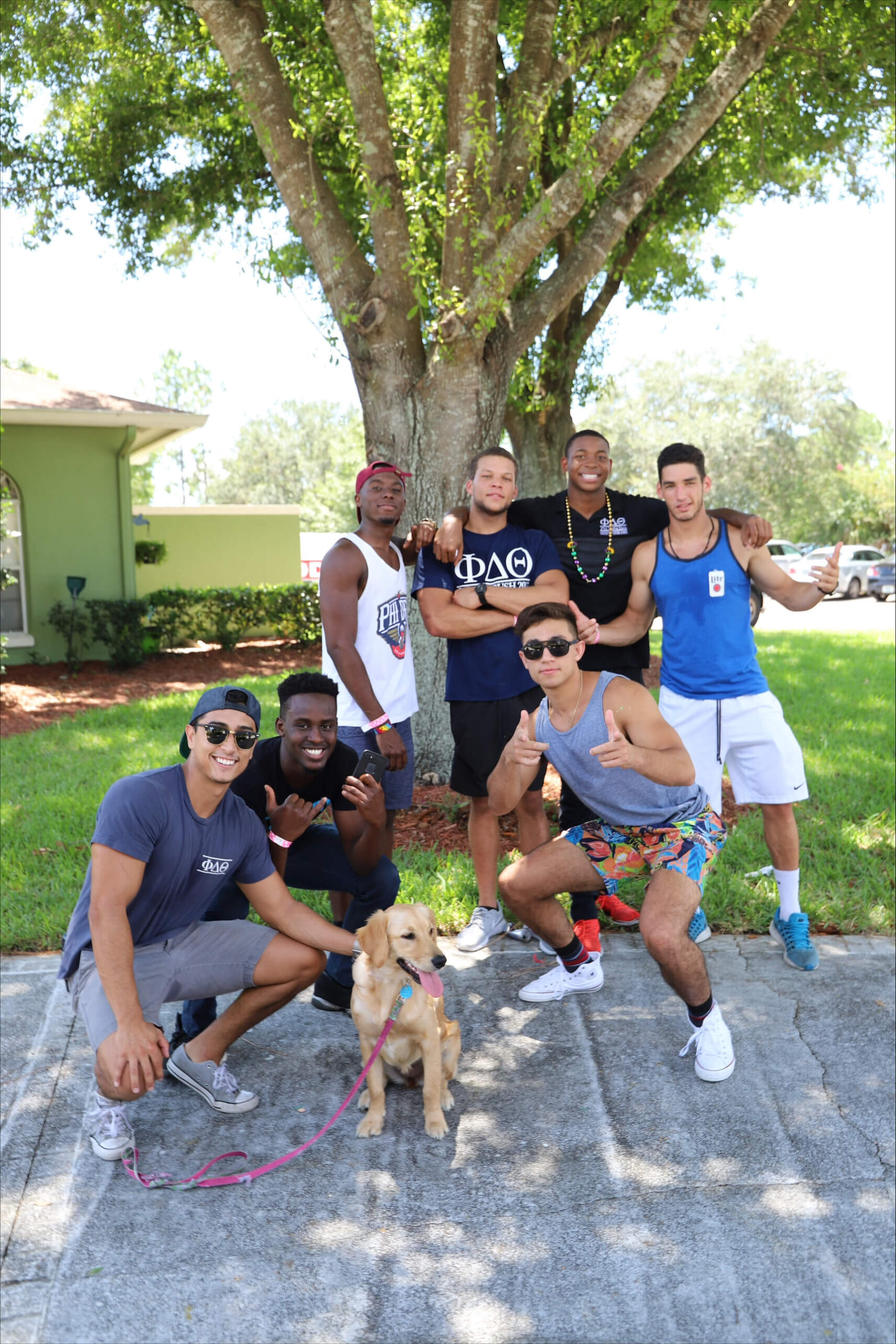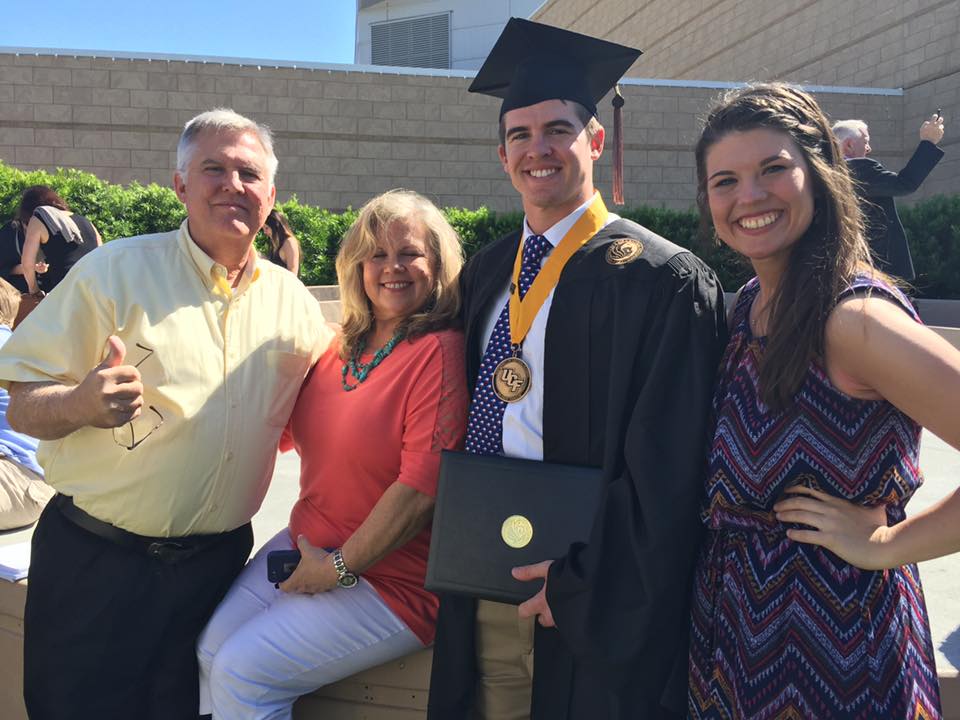Engineering a Second Career as Author: Terry Murphy ’85 ’89MS
By Camille Dolan ’98
Terry Murphy ’85 ’89MS grew up in the shadows of rocket and satellite launches from Cape Canaveral. It was, perhaps, only natural that he became interested in science and math – and more importantly, excelled at those pursuits.
Now, after a rewarding career as an electrical engineer and corporate executive, Murphy has embarked on his second career, this time as an author.

Murphy and his wife, Tracey, live an active, beautiful life in Georgia. Murphy just published the third book in his trilogy, The Cranio-Genesis Project.
“I was always putting things together, and then taking them apart,” Murphy says, of his childhood. “I knew I wanted to be an engineer.”
He was the top graduate in engineering at UCF’s May 1985 ceremony, and was commissioned as an officer in the U.S. Navy shortly afterward, where he taught for four years at its Nuclear Power School in Orlando. He simultaneously continued his education at UCF, earning a master’s degree in mathematics.
Murphy had also seen the future. As someone who had grown up at the beginning of the computer age, he realized where he should focus his career efforts.
“I became very interested in semiconductors while at UCF, but wished to pursue my engineering education further,” Murphy says. He earned a coveted spot in the master’s program in electrical engineering at Georgia Tech.

“In one of the first classes at Georgia Tech, they told us that most of us would not be prepared for the rigors of their graduate program,” Murphy recalled. “I felt that my time at UCF had prepared me just fine, and I graduated with a 4.0 from their program.”
He was heavily recruited after graduation. He had studied the big tech firms and knew where he wanted to go.
“At the time, Texas Instruments was a leader in night vision technology,” Murphy says. “I had studied both infrared technology and microelectronics while at UCF and digital signal processing at Georgia Tech. The position in the Advanced Technologies organization utilized all three and was a perfect fit.”
At Texas Instruments, Murphy worked in the design, development, and management in the area of infrared imaging components. He also developed various sensor systems for airbags and hard disk drives. He was the principal on five trade secrets and ten patents in infrared technology, photo-sensing, and MEMS technology, many of which are still being used in multiple products today.
When Texas Instruments Infrared Technologies Division was sold to DRS Technologies, Murphy continued his march up the corporate ladder, becoming president of its infrared business unit before being elevated to the company’s Chief Operating Officer.
In 2014, he was honored by the UCF College of Engineering and Computer Science as a Distinguished Alumni (below).

“At the time, I was working in Washington, DC,” Murphy says. “It was a complete surprise, and so my wife, my mom, and I went down to UCF for the ceremony. It was very nice to be recognized, particularly as I was coming to the end of my corporate career.”

Murphy had long ago decided that money was not the primary motivating factor in his life; he had also decided that when he reached the age of 55, he would retire. And so, he did.
Coming from a large family, Murphy jokes that his mind was his only private space. He ascended into the C-suite not only because of his intelligence and business acumen, but also because of his creative problem-solving, wondering how to improve things and make them more efficient.
With his newfound free time post-retirement, Murphy pursued a second dream career as a science fiction writer. He began with a writing project that had been on his mind for a while.
As an electrical engineer, Murphy extended the familiar concept of electrical stimuli being used to restart a heart into a restart of our most important organ, the brain.
In his trilogy, Murphy applies the concept of electromagnetic stimulation of brain dead patients to revive them.
“It’s a conceptual offshoot of the defibrillator,” Murphy says, “But you can provide enough plausibility in a work of fiction to grab the reader. And if the reader can move forward with the fictional concept, they will follow the remaining plotline that flows from the repercussions.”
No plot-spoilers here. For some of the repercussions that Murphy created, you’ll just have to read the books.
Of course, it wouldn’t be a spoiler to say that his books do include references from Murphy’s considerable background and the things he has been involved in throughout his career.
He also just signed a deal to bring his trilogy to life via audiobooks.
“A publishing group is going to take all of the financial costs upfront, and they’re going to hire the actors to do the readings and produce all the recordings,” Murphy says. “I wasn’t planning on pursuing this avenue, but after doing a little research, I learned that audiobooks are now outselling electronic books, and it is by far the fastest-growing segment of the book publishing world.”
He still has many ideas that he would like to explore in his writing, Murphy says.
“Right now, I’m having fun with it,” Murphy says. “Sometimes, I’ll be sitting there working on a draft, and I’ll start laughing. My wife, who is great at keeping me on track, will look over at me and ask me what’s going on, and it is just something that the characters are saying, or just an idea I came up with.”
Currently, Murphy is working on a five-book series about the world emerging from the devastation caused by the reversal of Earth’s magnetic poles. He then plans to create a third series about Mars and the discovery of an ancient ruin that triggers Earth’s nations to react.
Murphy understands the importance and protections provided by Earth’s magnetic poles. A reversal of the poles has happened periodically over Earth’s history. The transition does not occur instantaneously but gradually over hundreds of years.
“Scientists can tell what happened by measuring magnetic layers within certain rock formations,” Murphy says. “What’s interesting is that during that transition period, Earth’s magnetic poles provide significantly reduced protections against solar and cosmic radiation.”
The last time the poles shifted, Murphy says, was “more than 40,000 years ago, and has been tied to the creation of the Outback in Australia, and the end of Neanderthals because of the extreme climate change.”
The premise of his new series is the post-reversal world after the damaging radiation causes “significant mutations.”
“I think many people don’t understand the nature of the shifting magnetic poles well enough. When it happens again, and it will, there will be a lot of dangerous side effects,” Murphy says.
Murphy smiles at the thought of creating his own post-world and the storyline that goes along with it. He has also toyed with returning to his initial trilogy and editing some of his early writing.
“I’ve had to learn a lot about the craft of writing, and I’m still learning,” Murphy says. “As I look back at my first book, I say, ‘I need to go back and rewrite this. I’ve gotten considerably better.”
Murphy credits that desire to keep challenging himself from his different experiences throughout his life – growing up on the Space Coast with his large, active family, his time in the Navy, and, of course, UCF.
“I’m so proud to be a part of the UCF family,” Murphy says. “My time at UCF laid the groundwork for a wonderful career. I loved my college years there. Great friends and great experiences. Electronics were starting to boom, and it was an ideal time to be involved in the growing era of microelectronics. My professors were great and always encouraged me to follow my passions. Even now, decades later, I’m into a wonderful chapter with my second career and still Charging On. Go, UCF!”


